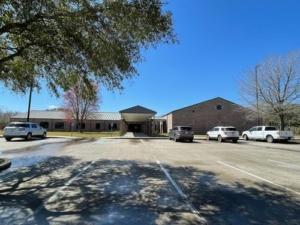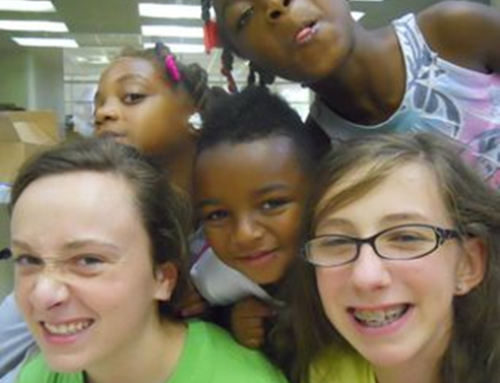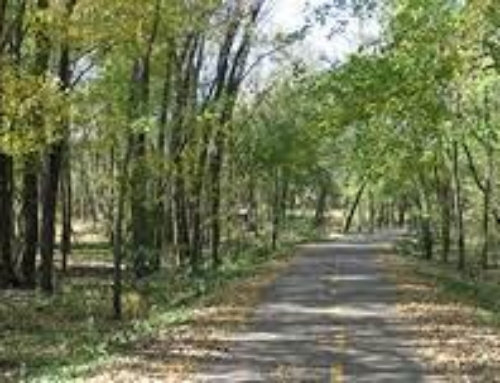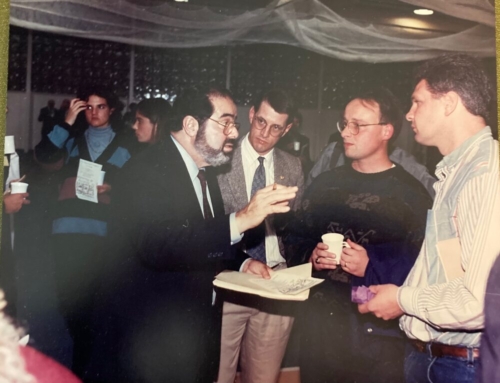Our time at the Antioch church was as blessed as it was brief.
 After serving there for several years, cracks in the church leadership began to show. Staff were leaving. Church board members were leaving. Despite being in a growing suburban community, church attendance had plateaued — new members merely replaced the families who left. It became clear to us that it was time to move on.
After serving there for several years, cracks in the church leadership began to show. Staff were leaving. Church board members were leaving. Despite being in a growing suburban community, church attendance had plateaued — new members merely replaced the families who left. It became clear to us that it was time to move on.
We loved Wisconsin. Our kids loved it. They loved their school and their friends. Our family loved being near Chicago and Milwaukee. Kris and I had great friends. And we loved our Green Bay Packers. We kept holding on to the hope that things might get better. They didn’t.
By the time we decided to leave, it became clear that we had stayed too long. Now I needed to find a new ministry position posthaste. Hoping to move that summer, I applied at more than a dozen churches by early winter. The previous year I had applied for associate pastor positions and had no problems getting job interviews. Not really wanting to move, I set unreasonably high expectations. I could not afford to do that this time. My only real constraint was location. I wanted to stay, in the Midwest, near our family and friends.
In my job search, I came across a perfect associate-pastor position. The church’s ministry philosophy matched mine. The job description was a perfect fit for my skill set and experience. However, there was one catch: It was in Louisiana. On a lark, I decided to apply. What could it hurt? Worst case scenario, Kris and I would get a free trip to Louisiana.
By the early spring, I had not heard from one single church. The previous year I had interviews with 50% of the churches within weeks. Now, it had been months, and there had been no responses — except from the church in Louisiana.
I had a phone interview with them that went surprisingly well. The search committee told me they would email me a questionnaire to garner more information. I was just curious enough to continue the process. What could it hurt?
I continued applying to Midwestern churches. It was now late spring, and still nothing. Then it dawned on me. I had never received that email from the Louisiana church. Frankly, it had not a high priority for me, so I had entirely forgotten about it. Without any other prospects, however, the church in Louisiana was starting to look good.
I called the search committee chairman, Rusty, and let him know that I had never received his email. Rusty told me that the email had been sent out the very next day. (After our conversation, I found his email in my spam folder.) I told him that I would gladly fill out the questionnaire now.
Rusty paused, then he said, “I’m sorry, John. It’s too late.”
“Our conversation with you was weeks ago,” he continued. “We continued the process and we are currently conducting our final interviews with our top two candidates.”
After we hung up, I regretted not taking this opportunity more seriously.
It was summer and still no leads. Moving before our children’s school year started was now impossible. Making matters worse, the Antioch church situation was deteriorating. Church attendance was in decline. Church finances would soon be getting tight. Within a year, church attendance would decline by over 50%. Amid this darkness was a faint glimmer of light: Rusty called.
Rusty told me that the search committee had decided not to hire either of their final two candidates. Instead of starting the entire job search process over again, the search committee decided to continue the process where they had left off with me. Rusty asked if I would still be interested in filling out their questionnaire? Trying not to act too eager, I said, “Sure, why not?”
A few weeks later, Rusty called me back. “The search team would like to fly you and your wife out to Lafayette for an interview. We would like you to stay a few days to meet with the search team, the pastoral staff, all our ministry leaders, and stay for our Sunday service.”
We finally had our free trip to Louisiana! More importantly, Trinity Bible Church was our only prospect.
Not having been to Louisiana before, I had stereotypical ideas of what things would be like. Much of my prejudiced thinking would be disabused on this trip.
Kris and I arrived in Lafayette the second week of August in 2004. As we were driven through suburban neighborhoods to our first destination, we were surprised not to see pirogues, alligators, or homes sitting on stilts on the bayou. Other than live oak trees, crepe myrtles, magnolia trees, and several large coulees running through town, Lafayette resembled a typical Midwestern town.
To my surprise, everyone on the search committee was extremely well educated. The search committee was composed of engineers, geologists, business owners, university professors, and lawyers. I have no idea what I anticipated, but subconsciously I must have envisioned visiting something akin to the set of “Swamp People,” with someone yelling, “Choot ‘em Jacob” in the background. The members of search committee were impressive.
I was pleasantly surprised not to hear a thick southern accent in the room. Although I did not detect an accent from anyone there, to my surprise, I was told that I had an accent. What?! How on earth can someone from the Midwest have an accent? That’s the way you are supposed to talk! Other than the way we say “Wis-CON-sin” and “PEE-can,” to this day, I still have no idea what it means to have a Midwestern accent.
The week we visited, Lafayette had record-setting low temperatures. The average daily highs were 83 degrees, with the lows in the 60s. For perspective, the average high and low temperatures for Lafayette in August are a humid 94 and 74 respectively. August is also the peak of hurricane season.
Kris and I actually ate lunch outside with the pastoral staff in the middle of August. Today, I realize that was tantamount to Moses crossing the Red Sea on dry ground. That simply does not happen. Whether it was divine-intervention or a happy coincidence, the week we arrived for our interview happened to be unseasonably cool and dry. In fact, on August 15th, 2004, Lafayette set a record low for the entire month of August at 58 degrees. It felt like the summer days in Wisconsin.
The interview went well. Kris and I felt positive about all our meetings and interactions with the people we met. In many ways, Trinity felt like home — except for the part that it was 1,000 miles away.
Before we returned to Wisconsin, they made us a very generous offer. Not only would they pay for our move, they offered me a $10,000 signing bonus. Who gives an associate pastor a signing bonus?! Still, this would be a monumental move for our family. We asked the search team for a little time to think and pray about their offer.
The day we left Louisiana, the historic cold front as well left. Lafayette returned to its sultry summer days. When we returned to Wisconsin, we had a surprise waiting for us when we got home. Our mailbox was stuffed full of church inquiries. Over the span of a week, we had received follow up questionnaires and information packets for nearly a dozen churches. How is it that I did not hear anything from any midwestern churches for eight months, then over a span of five or six days we received a deluge of inquiries?
Instead of praying about our current offer, I began feverishly reading all the church information packets and filling out questionnaires. During this interim, we continued to receive inquiries from churches. As our Louisiana deadline loomed, I realized I needed to make a decision. If I wanted to apply to these churches, I would have to say “no” to Lafayette.
We prayed and asked God for discernment. I realized that it was odd not having heard from any church for months until after we had visited Lafayette. It was if God wanted us to judge the Louisiana church on its own merits apart from its location. It felt like all these odd circumstances were like God was revealing the path to us; another set of divine signs in our lives.
I called Rusty, and told him we would gladly accepted Trinity’s generous offer. We moved into our new home that December.
 Since moving to Louisiana, Kris and I have evacuated several times. Staying in a shelter was never a thought. Like many other middle-class folks, we might stay in a hotel or with friends. Is staying in a hotel a possibility for a poor family? No, it is not. In 2005, I never considered the obvious financial obstacles that the poor faced.
Since moving to Louisiana, Kris and I have evacuated several times. Staying in a shelter was never a thought. Like many other middle-class folks, we might stay in a hotel or with friends. Is staying in a hotel a possibility for a poor family? No, it is not. In 2005, I never considered the obvious financial obstacles that the poor faced.
One time we stayed with friends in North Louisiana during a hurricane. What if someone does not have a relational network that extends beyond their home town? I never considered that either. Many of the children we work with at New Hope have never left Lafayette. Their entire family and friend network is in Lafayette. That is a reality for many poor families in the United States. Many poor families have no place to go during a natural disaster.
Yet, even if the poor had a place to stay, how would they get there? Most of the evacuees that were staying in shelters arrived there by bus. Many poor don’t have access to vehicles. After working in an under-resourced community for more than decade, I now realize that transportation is one of the biggest hurdles that those living in poverty face.
For many, transportation is the biggest obstacle for getting a job. There is what is known as a job spatial mismatch. There are very few jobs of any sort in the “‘hood.” Not surprisingly, you will find less than 15% of all entry-level jobs in poor urban neighborhoods: there are no Starbucks or Taco Bells there. With higher crime rates and few potential patrons, one cannot blame businesses for not being established there. The result is that eighty percent of all entry-level jobs are in the suburbs, while many of those looking for that type of work live in poorer neighborhoods.
Where do urban youth find their first job? The nearest Burger King to New Hope is two miles away, down a street with no sidewalks, deep drainage ditches on both sides of the road, and no street lights. Walking down that street at night would be a death wish. I have never seen anyone walking down that road at any time of the day. Like most streets in Lafayette, it was not designed for pedestrians or cyclists. The nearest McDonalds is over three miles away. We had one teenager who walked 45-minutes one way to work at Taco Bell several times a week.
 Jargowksy states that if the cultural laziness myth were true, one would expect that “neighborhood poverty would respond slowly, if at all, to increased economic opportunity.” In other words, if jobs were plentiful and you offered jobs to the poor living in concentrated urban poverty, as a group they’d say, “Nah – I’m good. Thanks anyways.” That turns out not to be the case. When employment increases, unemployment in the hood rapidly decreases. When there are jobs, the street pharmacists take them.
Jargowksy states that if the cultural laziness myth were true, one would expect that “neighborhood poverty would respond slowly, if at all, to increased economic opportunity.” In other words, if jobs were plentiful and you offered jobs to the poor living in concentrated urban poverty, as a group they’d say, “Nah – I’m good. Thanks anyways.” That turns out not to be the case. When employment increases, unemployment in the hood rapidly decreases. When there are jobs, the street pharmacists take them.
During the economic boom from 1990 – 2000, the number of people living in high-poverty neighborhoods decreased by 25%: 2.5 million people left high poverty neighborhoods. In 1990, almost a third of all blacks lived in such neighborhoods. By the year 2000, it was down to 19%. These declines in poverty did not happen in just one or two cities, but across the country. It is not cultural laziness; it is lack of opportunity; it is context.
The Hurricane Katrina evacuees stayed in shelters because they had no money for a hotel room. They had no money because there were no jobs in the 9th Ward of New Orleans. They waited for the FEMA buses because they did not have a car.
In 2005, I thought I knew all about poverty, despite not knowing one single poor person. I viewed myself as a river-baby expert, despite not having dipped a single toe into the water. My conclusions were based on a deadly combination of context-less theories and unconscious biases.
Unbeknownst to me, this would soon change. My upstream River-Baby Journey would be starting shortly. I would soon learn for myself that I was as wrong about those who are poor in New Orleans, as I was about the middle-class in Lafayette. My views were informed by inaccurate stereotypes. In both cases, my views changed when I saw things for myself. As it turns out, there is no substitute for getting to know those whom we judge. There is no substitute for getting into the river and heading upstream for oneself.





